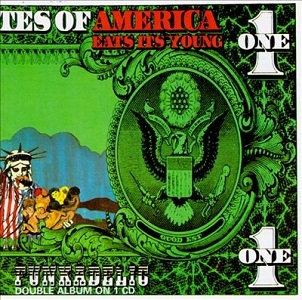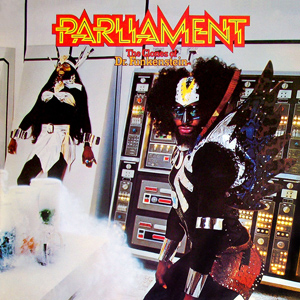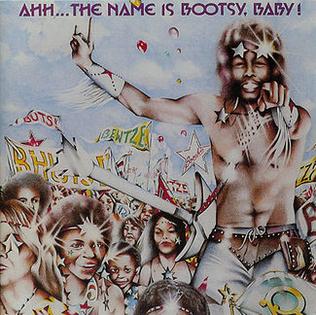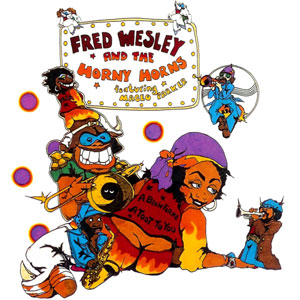
Parliament-Funkadelic is an American music collective of rotating musicians headed by George Clinton, primarily consisting of the funk bands Parliament and Funkadelic, both active since the 1960s. Their distinctive funk style drew on psychedelia, outlandish fashion, science-fiction, and surreal humor. They released albums such as Maggot Brain (1971), Mothership Connection (1975), and One Nation Under a Groove (1978) to critical praise, and scored charting hits with singles such as "Tear the Roof Off the Sucker" (1975) and "Flash Light" (1978). Overall, the collective achieved thirteen top ten hits in the American R&B music charts between 1967 and 1983, including six number one hits. Their work would have an influential effect on subsequent funk, post-punk, hip-hop, and techno artists of the 1980s and 1990s, while their collective mythology would help pioneer Afrofuturism.

America Eats Its Young is the fourth album by Funkadelic, released in May 1972. This was the first album to include the whole of the House Guests, including Bootsy Collins, Catfish Collins, Chicken Gunnels, Rob McCollough and Kash Waddy. It also features the Plainfield-based band U.S., which consisted of guitarist Garry Shider and bassist Cordell Mosson, on most of the tracks. Unlike previous Funkadelic albums, America Eats Its Young was recorded in Toronto, Ontario, Canada, and in the UK. The original vinyl version contained a poster illustrated by Cathy Abel. The bottom of the poster features the first widespread appearance of the Funkadelic logo, which would appear on the cover of their next album Cosmic Slop.

Cosmic Slop is the fifth studio album by Funkadelic, released in July 1973 on Westbound Records. While it has been favorably reevaluated by critics long after its original release, the album was a commercial failure, producing no charting singles, and reaching only #112 on the Billboard pop chart and #21 on the R&B chart. The album was re-released on CD in 1991.

Hardcore Jollies is the ninth studio album by the funk rock band Funkadelic, released on October 29, 1976 by Warner Bros. Records, their first album to be issued on a major label. It is dedicated to "the guitar players of the world." Originally, the first side of the album was called "Osmosis Phase 1" and the second side was "Terribitus Phase 2." Hardcore Jollies was released one month after Funkadelic's final album for Westbound Records, Tales of Kidd Funkadelic, which was recorded during the same sessions.

Tales of Kidd Funkadelic is the eighth studio album by the band Funkadelic, released in September 1976. It was their final album on the Westbound record label. The tracks were recorded during the same sessions as their first release for Warner Brothers Records, Hardcore Jollies; which was released a month later. Two tracks from Tales of Kidd Funkadelic, the single “Undisco Kidd” and the party anthem “Take Your Dead Ass Home!” have been staples in the band’s live performances since the album’s 1976 release, and can be heard on the 1977 Parliament concert album Live: P-Funk Earth Tour. The album opener “Butt-To-Buttresuscitation” and the song “I’m Never Gonna Tell It” were included in the band’s live shows during the early 2000s. The song "Let's Take It to the People" has been sampled by hip-hop band A Tribe Called Quest for their song "Everything Is Fair", on their album The Low End Theory.

Funkentelechy vs. the Placebo Syndrome is the sixth album by funk band Parliament, released in 1977.

Motor Booty Affair is the seventh album by funk band Parliament. Released on November 20, 1978. It contains two of the group's most popular tracks, "Rumpofsteelskin" and "Aqua Boogie " which went to number one on the Billboard Soul Singles chart.

Chocolate City is the third album by the funk band Parliament, released in 1975. It was a "tribute to Washington D.C.", where the group had been particularly popular. The album's cover includes images of the United States Capitol, the Washington Monument, and the Lincoln Memorial in the form of a chocolate medallion, as well as sticker labeled "Washington DC". The album was very popular in the capitol city, selling 150,000 copies alone there.

Computer Games is the debut album by American funk musician George Clinton, released by Capitol Records on November 5, 1982. Though technically Clinton's first "solo" album, the record featured most of the same personnel who had appeared on recent albums by Parliament and Funkadelic, both formally disbanded by Clinton in 1981. Conceived in the aftermath of a period marked by financial and personal struggles for Clinton, Computer Games restored his popularity for a short time before P-Funk fell victim to renewed legal problems and scant label support in the mid-1980s.

Gloryhallastoopid (Or Pin the Tale on the Funky) is the eighth album by the funk ensemble Parliament. It was their penultimate album on the Casablanca Records label, and is another concept album which tries to explain that Funk was responsible for the creation of the universe (see P Funk mythology). It reuses samples from previous albums, notably the Mothership Connection and Funkentelechy vs. the Placebo Syndrome.

The Clones of Dr. Funkenstein is the fifth album by funk band Parliament, released in September 1976. The album is notable for featuring horn arrangements by ex-James Brown band member, Fred Wesley. The album charted at #3 on the Billboard R&B Albums chart, #20 on the Billboard pop chart, and became Parliament's second album to be certified gold. Two singles were released off the album, "Do That Stuff", which charted at #22, and "Dr. Funkenstein" which charted at #43.

Trombipulation is the ninth album by the funk band Parliament. It was released by Casablanca Records. It was the last album of original material produced by the group for 38 years until Medicaid Fraud Dogg in 2018. Unlike previous Parliament albums, George Clinton did not serve as sole producer of the album, as other P-Funk figures assisted in producing individual tracks. Bassist Bootsy Collins emerged as the principal musician on this album, playing virtually all of the instruments on a number of tracks. The track "Let's Play House" was sampled by the Hip-Hop group Digital Underground for their single "The Humpty Dance".

Ahh...The Name Is Bootsy, Baby! is a funk album by Bootsy's Rubber Band, released on January 15, 1977. It reached number one on Billboard magazine's Top R&B/Soul albums chart, the first P-Funk release to achieve this goal. The album was produced by George Clinton and William "Bootsy" Collins and arranged by Bootsy and Casper.

All The Woo In The World is the debut funk album by Parliament-Funkadelic keyboardist Bernie Worrell, released in 1978 by Arista Records. The album was produced by Bernie Worrell and P-Funk leader George Clinton and features various P-Funk alumni including Garry Shider, Bootsy Collins, Junie Morrison, Billy Bass Nelson, and Eddie Hazel.

Funk or Walk is the debut album by the Brides of Funkenstein, released on Atlantic Records in September 1978. The album was produced by George Clinton with the exception of the album's first single "Disco To Go" which was written and produced by Clinton and Bootsy Collins. The Brides of Funkenstein consisted of Lynn Mabry and Dawn Silva, who were members of Sly and the Family Stone prior to joining P-Funk. Funk Or Walk earned Mabry and Silva a Record World Award for Best New Female Artists and Best New R&B Group in 1979. The song was originally performed live by Bootsy's Rubber Band. To this day, the P-Funk All Stars continue to play "Disco To Go" in their live concerts. The Brides of Funkenstein also toured and recorded with Parliament/Funkadelic around this same time.

A Blow for Me, a Toot to You is a 1977 album by funk musician Fred Wesley and the Horny Horns featuring Maceo Parker.

George Clinton: The Mothership Connection is a DVD released in 1998 and then reissued in 2001, featuring George Clinton and Parliament-Funkadelic. The DVD features a concert performed by Parliament-Funkadelic at The Summit in Houston, Texas on October 31, 1976. The DVD documents the beginning of famed P-Funk Earth Tour, which would run for almost two years.

Testing Positive 4 the Funk is the fourth installment of the George Clinton Family Series collection. The album was released in 1993 by P-Vine Records in Japan, and then was released later in the same year by AEM Records in the United States and Sequel Records in the U.K. This collection is noted for the inclusion of tracks such as a re-recording of "Live Up " which was originally recorded by the soul quartet, The Fantastic Four. The track marked the debut of P-Funk vocalist Glenn Goins.

Plush Funk is the third installment of the George Clinton Family Series collection. The album was released in 1993 by P-Vine Records in Japan, and then was released the next year by AEM Records in the United States and Sequel Records in the United Kingdom. The CD features the track "May Day (S.O.S)", which was an outtake from the Funkadelic album "The Electric Spanking of War Babies".

A Fifth of Funk is the fifth and final installment of the George Clinton Family Series collection by Parliament-Funkadelic collective members. The album was released in Japan in 1993 by P-Vine Records, and later in the same year by AEM Records in the United States and Sequel Records in the United Kingdom. The compilation's producer and P-Funk leader George Clinton gives his final thoughts about the tracks on the album, as well as his feelings on the entire Family Series project, for A Fifth of Funk's final track. The title is a play on words of Beethoven's Symphony No. 5, as well as Walter Murphy's 1976 disco hit "A Fifth of Beethoven".




















